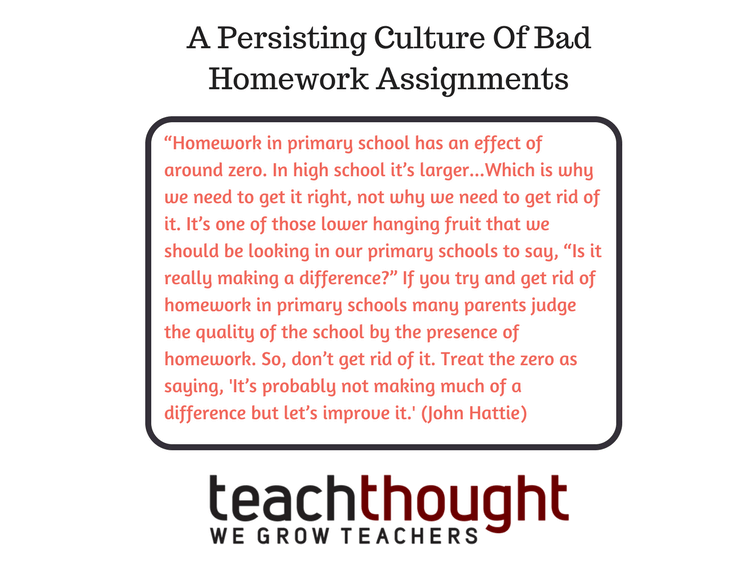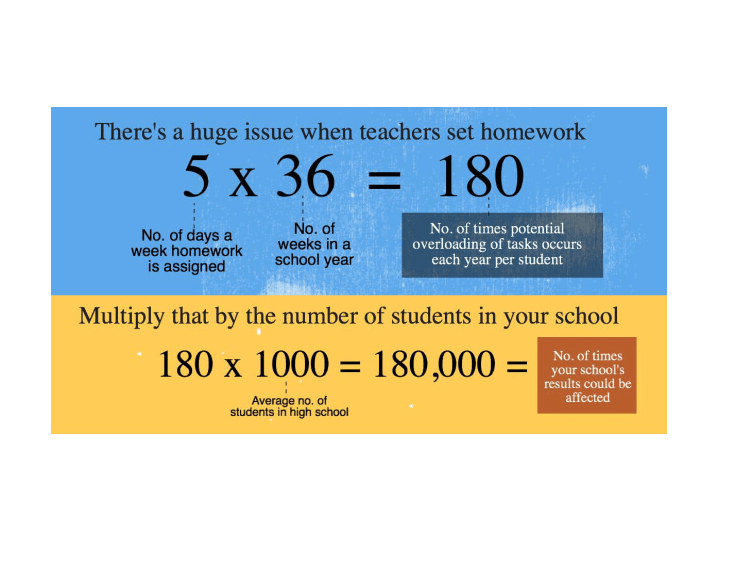
Education’s Strange Culture Of Bad Homework Assignments
by TeachThought Staff
Homework in elementary school has an ‘effect size of zero.’
We’ve written about John Hattie’s seminal aggregation of data on what works in formal education before, including On Data-Based Teaching: 6 Questions Hattie Didn’t Ask But Could Have.
“Homework in primary school has an effect of around zero. In high school it’s larger…Which is why we need to get it right. Not why we need to get rid of it. It’s one of those lower hanging fruit that we should be looking in our primary schools to say, “Is it really making a difference?” If you try and get rid of homework in primary schools many parents judge the quality of the school by the presence of homework. So, don’t get rid of it. Treat the zero as saying, “It’s probably not making much of a difference but let’s improve it.” Certainly I think we get over obsessed with homework. Five to ten minutes has the same effect of one hour to two hours. The worst thing you can do with homework is give kids projects. The best thing you can do is to reinforce something you’ve already learnt.” (source)
We’ve written about John Hattie’s seminal aggregation of data on what works in formal education before, including On Data-Based Teaching: 6 Questions Hattie Didn’t Ask But Could Have. Below Paul Moss takes a look at how bad homework assignments can harm students.
The inefficiency with homework setting is scandalous.
In a culture so heavily invested in progress, the anomaly of unattended and unmoderated homework assignment seems scandalously peculiar. To say it is one of the strangest contradictions in education is an understatement, with the random assigning of homework making a total mockery of the level of detail and fine-tuning that goes into every other teaching and learning policy a school is defined by.
Despite a new surge in notification tools, homework assignment still remains a lawless enterprise, with even the best of willed teachers being reduced to mavericks, having to set work for their students with no idea of how much work they have already been set by other teachers. The teacher cannot tell if they may be overloading them, which results in a range of issues.
See also An Index Of Teaching & Learning Strategies: 39 Effect Sizes In Ascending Order
How Bad Homework Can Hurt Students

1. Loss of performance
How much work a student has to negotiate is obviously going to have a direct impact on the performance within/on those tasks. When teachers assign too much work, the students have to make choices about how to disperse their time and attention. Which task/s should they complete with full commitment? Which should they leave? Or should they half-invest in all of them?
Whatever the choice, the compromise inevitably results in a loss of learning potential. That potential is significant for every student, especially when the compromise above relates to assessment revision. The number of times that schools set major tests on the same day is incredible, and it results in an inaccurate representation of student performance.
On the school level, as the above graphic illustrates, the combined loss over a school year is nothing short of astronomical. The only explanation for this must be the notion of out of sight out of mind, but with senior leadership meetings becoming increasingly dedicated to analyzing and using data to find causation to a lack of progress, or ways to enhance progress, the above figures are the very large elephant in the room.
2. Reduced well-being
Students spend a long day at school, and the amount of energy it takes to then have to work at home and carry on the effort should not be underestimated. Students who are overworked face the very real possibility of burning out, either physically, mentally, or probably both. So why then does every school that works very very hard to ensure that their students’ well-being is at the forefront of every policy that directs its rationale, allow students to be susceptible and vulnerable to unnecessary stress caused by random assigning of homework?
Schools in fact have an ethical responsibility to its students to ensure that this very thing doesn’t happen, and that most certainly means a rethinking of homework policy.
Many educators would state that the answer is homework schedules: a schedule that assigns specific days for subjects to set homework, and specific amounts. While schedules do serve to prevent unnecessary stress to some degree, that ‘degree’ is minimal; the schedule often ironically forces teachers to set tasks even if they aren’t justified. They often feel like they can’t miss their slot or chance to have students doing homework.
When you consider that the average high school student has up to 10 subjects to study, resulting in 2 subjects per night, and that often Math, English, and Science often get more than 1 slot, students need to become machine-like to cope.
Added to that are a range of other arguments that derail the schedule myth.
3. Bad vibes
Another issue that stems from overloading students is the creation of a negative attitude towards homework. Understandably, getting students to buy into the policy is impossible when the overarching perception is that the process is unfair, inequitable, and exhausting. Students’ grumbles abound whenever homework is set, but never more so than when students know they already have a lot of work from their other classes.
The issue though for the teacher it’s hard to know whether the students are telling the truth, or just complaining at ‘any’ work. The teacher then rarely backs down or compromises with the new task, and the result is feelings of annoyance and distrust permeating the room. A culture of distrust vs a culture of transparency. I know which I prefer to teach with.
The issue though for the teacher is that they don’t know whether the students are telling the truth, or just complaining at ‘any’ work. The teacher then rarely backs down or compromises with the new task, and the result is feelings of annoyance and distrust permeating the room. A culture of distrust vs a culture of transparency? I know which I prefer to teach with.
Conclusion
Overloading reduces performance, stresses students, and creates a negative atmosphere in the classroom. In an age that worships efficiency and progress, even in a business setting this would be unacceptable. The inefficiency of random homework assignment undermines good work done by teachers to grow student thinking.
The inefficiency of random or otherwise poorly designed homework assignments undermine good work done by teachers to develop important 21stcentury skills in their students. Students become demoralized by the lack of transparency, and confused by the irony of their school’s relentless pursuit and promotion of organization being a key to success. Many students will power on and through, but potentially to a lesser pace–and place.
Now is the time for schools to renegotiate their homework policies. Now is the time for schools to realize that learning out of sight shouldn’t be out of mind. Let’s end our existing–and endlessly persisting–culture of bad homework assignments.
Education & Our Strange Culture Of Bad Homework Assignments